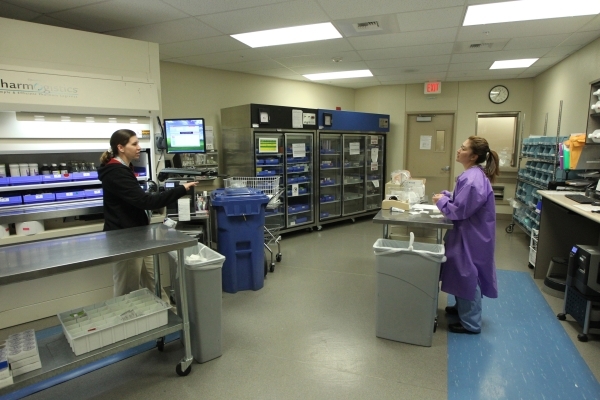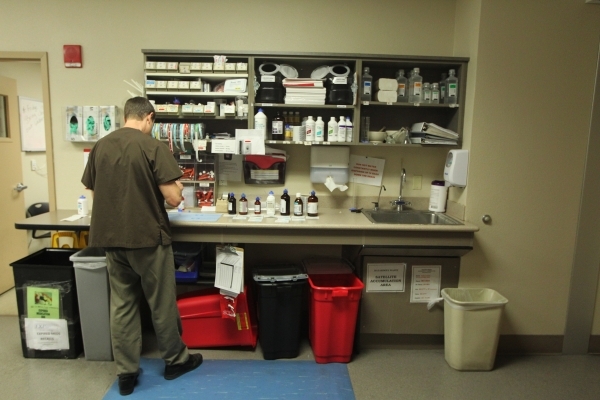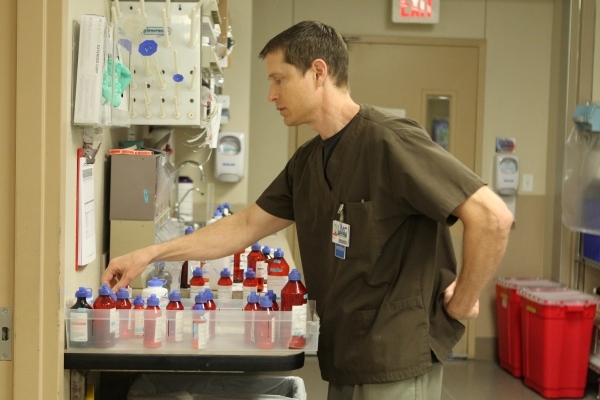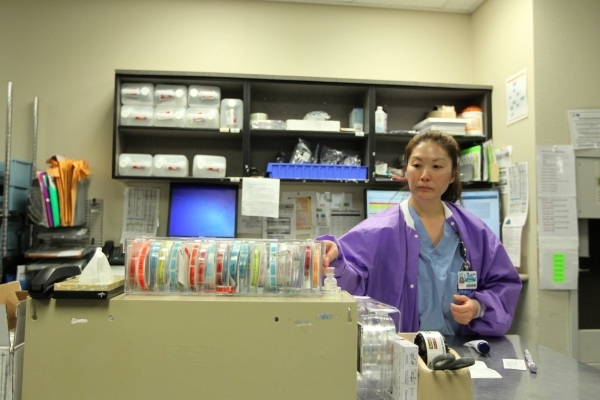Doctors, pharmacists, patients urged to use generic medications
There are few certainties in health care because every patient is different, but one thing's a cinch: Medications won't work if patients don't take them.
A national association of doctors this week urged physicians to order generic drugs whenever possible because patients are more likely to fill their prescriptions.
The American College of Physicians said generic medications cut costs, increase patient compliance and improve health outcomes.
Southern Nevada doctors and pharmacists say the report in the Annals of Internal Medicine reinforces what they've seen in their practices over the years.
"Cost has a role, clearly, in this lack of adherence," said Dr. Scott Stolte, dean of the College of Pharmacy and a professor of pharmacy practice at Roseman University of Health Sciences.
Doctors face challenges with patients who don't want to take drugs or follow medical recommendations, said Dr. Joe Hardy, a family practitioner and professor at the Touro University Nevada School of Medicine. Patients choose not to comply for many reasons, from the costs and trouble obtaining medications to hassles with insurance to recommendations for diet and exercise.
Health care plans are developed to facilitate compliance. The goal in medication administration is a once-a-day, easy-to-afford, easy-to-fill, no-side-effects medication, Hardy said.
"I'm much better at taking a medication once a day than I am two times per day," Hardy said. "And I'm much better taking a prescription twice a day than I am four times per day."
In its report, the American College of Physicians said about $325 billion are spent annually on prescription medications in the United States. That cost could be cut significantly if people used generic medications, the group said.
When pharmaceutical companies patent a new drug, they have exclusive marketing rights granted by the U.S. Food and Drug Administration that can run for months or years. After all drug exclusivity protections expire, competitors can enter the market after the FDA approves generic versions of the drug.
The report notes that the patents for several "blockbuster medications" have recently expired:
* Clopidogrel, a blood thinner for people who have had a stroke, heart attack, or severe chest pain.
* Atorvastatin, which decreases "bad" cholesterol and triglycerides in the blood, and increases "good" cholesterol.
* Olanzapine, a treatment for the symptoms of schizophrenia.
Researchers looked at how frequently generic drugs for Medicare patients with diabetes are overlooked for brand-name drugs and how well generic medications work. Brand-name drugs were prescribed 23 percent to 45 percent of the time though effective generics were available. The group's researchers said Medicare could save $1.4 billion for diabetes alone by using generic medications instead of brand-name drugs.
Lower prices for generic drugs imply to some patients that they are less effective than expensive brand-name medications, the group said, and confusion is created when generic medications look different from brand-name drugs.
Generic drugs cannot be substituted in some instances. In some case, the absorption factor can be more efficient in the brand-name drug, or the dosage options might be limited with the generic alternative.
Synthroid, the brand name for a thyroid hormone, also is distributed under the generic name levothyroxine. The medications treat hypothyroidism, replacing thyroid hormone in patients who do not produce enough.
The body cannot function properly without thyroid hormone, and patients can have slow speech, fatigue, constipation, weight gain, hair loss, joint and muscle pain, and depression.
Endocrinologists might order Synthroid because they want a specific dosage not available with levothyroxine. When they want a brand name, doctors include "Dispense as written" in the order.
With most medications, generic alternatives can produce the same effect at the site of physiological activity. Beta blockers are widely prescribed drugs for reducing blood pressure. Coreg, also distributed under the generic name carvedilol, relaxes blood vessels and slows heart rate to improve blood flow and lower blood pressure.
Patients can ask their doctors if an effective generic version is available when they are prescribed a brand-name drug. Pharmacists or their staff members should ask patients whether they want the generic substituted.
"Coreg is an expensive medication when it's prescribed as branded," Stolte said. "If no designation is on the prescription, and the prescription is written for Coreg, then that prescription can be substituted with the generic."
For years, advocates for lower health care costs faced a challenge in convincing patients that generics were as effective as brand-name drugs.
"Most of the time the generic drugs are just as effective as the trademark drugs," said Dr. James Anthony, a family practitioner and member of the Nevada State Board of Osteopathic Medicine. "They're more accepted than than they were 10 years ago."
"What really resonates with patients is for pharmacists to tell patients success stories," Stolte added. "I have worked with many patients who have had great success with generic medications because they are bioequivelent. The science is important, but the empahsis to the patient needs to be that the science is backed up by stories of success."
Whether a patient takes a brand name or generic, doctors and pharmacists do not make money on the drugs they prescribe and dispense.
"Neither the pharmacy nor the doctor have a vested interest in patients taking a brand name," Stolte said.
Hospitals also encourage the dispensing of generic drugs, and their in-house pharmacies are not major revenue sources, said Brian Branmann, head of the nonprofit organization Dignity Health Nevada.
"There's a little bit of a mark up on everything," Brannman said. "Most pricing in health care is a pretty complex thing, but it basically covers its costs."
Doctors say they prefer generic drugs because of the data showing patient outcomes improve, and the cost savings are an added benefit.
"Not only are prescription-by-prescription costs going to be lower, but also the overall health care costs are going to be lower," Stolte said.
Contact Steven Moore at smoore@reviewjournal.com or 702-380-4563. Find him on Twitter: @steve_smoore_rj





























